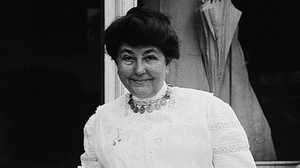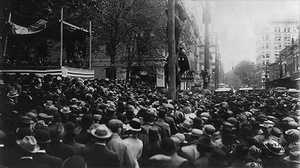William Jennings Bryan

Before Woodrow Wilson became the standard bearer for the Democratic Party, that honor belonged to William Jennings Bryan, known both as "the Great Commoner" and the "Boy Orator of the Platte." Bryan's support of Wilson at the 1912 Democratic Convention broke a deadlock after 46 ballots and gave Wilson the presidential nomination.
Born in Salem, Illinois in 1860, Bryan was imbued with both a fierce Protestant faith and a strong allegiance to the Democrats. Seeing no future in Illinois after his graduation from Union Law School in 1883, he moved to Nebraska. In 1890, Bryan ran for Congress as a Democrat and was elected.
Bryan's skill as a speaker soon secured him the leadership of the "free-silver" Democrats as well, advocates of the free coinage of silver as a way to relieve crippling farm debt. Bryan's scathing denunciation of attempts by the "great cities" to impose a gold standard - his "Cross of Gold" speech at the Democratic convention in 1896 - is considered one of the greatest political speeches in American history. "You will not press down on the brow of labor this crown of thorns," he thundered to the wildly cheering crowd. "You shall not crucify mankind upon a cross of gold." It gained Bryan the presidential nomination. He was only 36.
Bryan lost to William McKinley then ran for president and lost twice more, in 1900 to McKinley again and in 1908 to Theodore Roosevelt's candidate, William H. Taft. By the 1912 election, Bryan was essentially the Democratic Party's "king maker"; though he himself would not be nominated, his endorsement guaranteed a candidate's success. Of the large field of nominees, Bryan ultimately gave his blessing to Woodrow Wilson, the progressive governor of New Jersey. Wilson was elected president and returned the favor by naming him Secretary of State. But Bryan's fierce commitment to American neutrality was even greater than Wilson's. When Wilson adopted a hard line against German submarine warfare - a position that led to America's entry into the European war - Bryan resigned in protest.
Bryan is remembered less for his lifelong, eloquent defense of the common man and more as the lawyer for the prosecution in the 1925 trial of John Scopes, a Tennessee schoolteacher accused of teaching evolution. In the course of the "Monkey Trial", defense lawyer Clarence Darrow put Bryan on the stand ridiculing Bryan's belief in the literal truth of the Bible. Bryan won the case, but died less than a week later.







